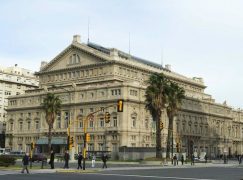Here’s how much more tax President Trump is making musicians pay
mainKevin Case, counsel to the International Conference of Symphony and Opera Musicians, spells out the nitty-gritty of the Trump tax-reform bill:
Under prior tax law, if you were an employee, the IRS allowed a deduction for “ordinary and necessary expenses” incurred in connection with your job. An expense is “ordinary” if it is “common and accepted” in your field; it is “necessary” if it is “helpful and appropriate” for your business. The expense didn’t need to be required by your employer to be deductible.
Many members of ICSOM orchestras have been taking advantage of that deduction for years. It isn’t hard to see why. Orchestral musicians incur substantial expenses in connection with their employment: union dues, work dues, concert clothing, unreimbursed travel expenses (including audition travel expenses), repairs and supplies for instruments, and—most importantly—the instruments themselves. Prior law—which includes the 2017 tax year for which many have not yet filed—allowed a tax deduction for all of that. If you’re a string player in particular, chances are you paid a very large amount of money for your instrument(s) and bows. You’ve been allowed to depreciate that property and deduct the value of that depreciation as an Employee Business Expense over a period of years or even, in certain circumstances, in a single year.
No more. …
Read on here.






Random question: were musicians allowed to depreciate and deduct period instruments such as a Stradivarius on their tax forms prior to this year?
Yes, and they still are if they’re self-employed.
Didn’t Trump have some connection to the Met? I know that he used to attend operas.
Was he ever a donor or on a Lincoln Center board of directors?
In 2016 a WaPo reporter tried to verify the many claims of support by Trump for various non-profits. Almost none of it could be confirmed.
https://www.washingtonpost.com/graphics/politics/2016-election/trump-charity-donations/
In the case of Lincoln Center, “not since 2006, at least” would mean that LC stated no donation had been received since 2006 and records for years prior to that were not available.
The Metropolitan Opera gave a “no comment.”
The article does show an instance where he was an “honorary chairman” of of a fundraiser (no money given however). If he had ever had a fundraising rquired position as a board member with either the Met or LC that would have been noted or remembered.
This only affects musicians (in common with all other professions) who are in full-time employment; so the headline is misleading. And to be fair, the standard deduction nearly doubles in the musician’s favour.
No, it affects any musician who is a W-2 employee of any orchestra, including all of us who are employed by multiple small-budget orchestras. Union dues, instrument supplies, repairs and maintenance, depreciation on your instrument(s), mileage from one’s home studio (which is usually a professional musician’s “principal place of business” as defined by the IRS, *especially* if one is a Freeway Philharmonic-er who plays for multiple orchestras) to rehearsal and performance locations, etc. are all no longer allowed.
The increase of the standard deduction will make up *some* of this for *some* players, but keep in mind that the personal exemption is also gone, so the value of the standard deduction is instantly $4000 less. Couple that with the limitations on state and local taxes which will disproportionately affect those of us in high-tax (for which read “heavily Democratic”) states, and the result will absolutely be that many musicians are negatively affected.
In exchange for higher taxes, musicians and choristers are now authorized to carry a gun to rehearsal, so long as their gun fits into their instrument case.
Advice to foreigner conductors and directors, weigh your words and actions very very carefully during rehearsal.
One of the main reasons this is presented as “higher tex” is because of a removal of some deductions. In the case of (salaried) musicians, a large part of this will relate to the costs of purchase and maintenance of their instrument. The reduction in deductions wrt the purchase and maintenance of an instrument has zero effect to a chorister, who may well benefit under these proposals by the near doubling of the standard deduction in any case.
See 53:30-54:44 in the clip below:
https://www.youtube.com/watch?v=Yfj0HbIi1i8
Carlos Kleiber greatly admired this performance from Kay. (Yes, I had to slip CK into it again!)
Oh, but the mafia got there first. Waaaay first. And y’all invited them in!!!
The charitable tax deduction allowed to American individuals and companies helped them donate $ 17.5 billion to the Arts, culture and humanities in 2014 according to Grantmakers in the Arts. Any curtailment to that deduction by Trump really will have adverse consequences on Arts Spending in the US as there is, comparative to Europe, so little direct state aid.
It is generally argued that the recent tax reform will affect negatiely charitable giving. Here is one many articles on this:
https://www.economist.com/news/finance-and-economics/21737089-local-non-profits-and-churches-will-be-affected-most-recent-tax-reforms
Results are not clear. Though well written too much is uncertain even net results for ICSOM musicians.